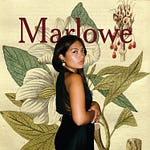I recently did two spontaneous things- one being this letter you’re currently reading and the other being the audio monologue in this letter I recorded a couple of days ago.
If you’ve listened to it and found yourself here, you must feel quite confused. Yes, I did say I wanted to give this Substack project a pause- you heard that right. And yet I found myself right back here again.
The funny thing is taking these two spontaneous ideas to actions were both very liberating experiences, but I only felt anxious when I was thinking of releasing them into the world.
I was worried that my spontaneous actions would come to bite me later because they weren’t planned out carefully and thoughtfully ahead of time. I didn’t weight the pros and cons. I didn’t analyze the possible outcomes. And the last time when I did something spontaneous was when I joined Substack and started this little adventure.
And see where we end up? My inner critique (I recently gave her a name: Sally) tries to save me from the embarrassment.
But then I thought to myself: When was the last time I was being spontaneous?
If you know me, you know I don't lack of spontaneous ideas - putting down a deposit for a puppy within the 10 minutes of searching on Kijiji; buying a flight ticket to London to see my best friend right after our Skype catch-up; bought the web domain of Dear Seekers as soon as the name came to me.
These actions may seem very irresponsible and are only considered as the by-products of being young and free, they also turned out to be the best spontaneous things I’ve ever done.
One actually saved me.
I was working as a waitress in a prestige retirement home when my best friend left Toronto to pursue her master in fashion journalism in Central Saint Martins. I was so lost and stuck while she was living the dream, for the both of us. During the nine months of drowning in racist comments from the residents, and taking care of people who came from a very privileged and narrow-minded world, I was being sucked deeper and deeper into a quicksand that I knew would require much more strength to pull myself out of than staying in. But if I don’t, I would simply just disappear.
So I flew to London.
The next year, I started Dear Seekers.
In hindsight, if I let my conscious mind do the decision-making, I would’ve never done such spontaneous thing and would’ve listed all the logical and analytical reasons to stop me from going.
How can you spend all these hard-earned money you made of out sweats and tears all at once on a senseless trip?
How can you afford to?
What are you going to do when you come back?
Do you realize how irresponsible you are?
I’m glad I buried these conscious thoughts. At that moment, it might seem like I made the spontaneous decision on a whim, but in hindsight, the urge was marinating subconsciously for a while before it took the lead.
"Analysis kills spontaneity," Swiss philosopher, Henri Frederic Amiel (1821-1881), once claimed that. He explained that the state of mind giving rise to creativity cannot be the conscious, critical mind, but rather the unconscious, non-evaluative, spontaneous one.
As we grow older, we seem to start giving “spontaneity” a very bad rep. It starts to stand in the same line with “irresponsibility” and “being immature”. Doing something spontaneous no longer brings joy, but anxiety. The initiation to meet up with friends have been from “are you free now?” to “are you free on Sunday at 1pm in two months?”
Especially now as a mother of a toddler, being spontaneous not only sound a little self indulgent, but also is not quite feasible.
But I believe we need spontaneity in our lives if we want to be creatively and spiritually fulfilled, because it happens to be one of the sources of creativity.
“The act of creation has something essential to do with both spontaneity and inspiration. And in some ways these two states of consciousness may be inseparable. For each of them involves newness or freshness--or, as we might put it in today's parlance, "thinking outside the box." Regardless of how much planning or thought may have gone into a work's preparation, its actual execution must be somewhat "thoughtless," in the sense that the creation--in the very process of "being born"--must somehow manage to transcend the creator,” in Psychology Today, Dr. Leon F. Seltzer talks about the “Wisdom of Spontaneity”.
Being spontaneous doesn’t mean buying a one way ticket for the whole family to the South of France and leaving everything and everyone behind (although that has always been one of my dreams). It sometimes just means recording a monologue on the go when the urge comes, or writing a Substack letter when the idea feels satisfying.
Being spontaneous often requires openness and that “letting loose” state of mind often leads to the emerge of our subconscious mind- the one that may have accumulated lots of inner wisdom and may have evolved further than our conscious mind.









